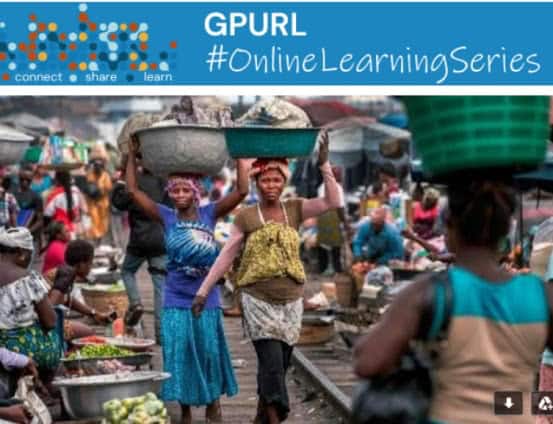World Bank-WIEGO Roundtable
-
May 19, 2020
- Online

The presentation by Jenna Harvey, Global Focal City Coordinator, WIEGO, covered the results of a rapid assessment of membership-based organizations of informal workers in the WIEGO Network, about the immediate impact of the COVID-19 crisis on informal livelihoods.
The presentation by Caroline Skinner, Urban Research Director, WIEGO, discussed how the informal food system is critical to urban food security. Measures to curb the spread of COVID-19 have profoundly disrupted these systems with significant food security implications. Unlike many other countries, South Africa declared informal food vendors essential service workers. Drawing on this case, the presentation highlighted short and longer-term urban planning and policy issues.
The presentation by Sonia Dias, WIEGO Waste Specialist, WIEGO, gave an overview on how waste pickers are being affected in the wake of COVID-19 in Brazil and shared some responses from cities and workers’ organizations. It highlighted the role of urban governance in pushing forward an agenda for reshaping selective waste collection towards improving occupational and health safety and social protection coverage in the city of Belo Horizonte, Brazil.
Chair and Moderator: Sameh Naguib Wahba, Global Director, SURDR, WBG
Introductory Remarks (included below): Marty Chen, Lecturer in Public Policy, Harvard Kennedy School. Affiliated Professor, Harvard Graduate School of Design; Senior Advisor, WIEGO Network
This public online event drew 180 participants. Presenters and discussants in the roundtable proposed a set of principles for protecting and promoting urban informal workers through the four stages of the COVID-19 crisis, suggested by Caroline Skinner in her remarks:
Thank you, Sameh. And thanks to Maitreyi Das and Judy Baker for organizing this roundtable. Good morning or good afternoon everyone, wherever you may be
Globally, nearly half (44%) of all urban workers are informally employed. In developing countries, 80 percent of all urban workers are informally employed. Economists tend to stigmatize informal workers as illegal or non-productive, a drag on the economy, while urban planners tend to see them as a nuisance or a blight on the city landscape. But the COVID 19 crisis represents a hinge moment for economists and cities to reset their perspective and policies towards the informal workforce.
As we all know, the COVID 19 pandemic-cum-lockdowns have caused major economic hardships around the world, particularly for the poor who live off daily earnings. The crisis has also laid bare pre-existing disadvantages and injustices not only in health care but also in economies and cities. It has also spotlighted the role of frontline workers in providing essential goods and services during the crisis. We have all come to appreciate these frontline workers and our dependence on them. But many frontline workers in health care, food supply, sanitation and transport services are informally employed, without social protection or legal rights. The challenge is to rebuild our cities and economies in ways that support these everyday heroes and reduce the pre-existing disadvantages and injustices that they have faced – since long before the crisis.
WIEGO is a global network that seeks to empower informal workers to secure their livelihoods – by building strong organizations of informal workers, by improving statistics and policy research on the informal economy and by creating policy spaces for informal worker leaders to engage with government and international agencies. Together with organizations of informal workers around the world, WIEGO has mounted a COVID 19 response to address the impact of the crisis on the lives and livelihoods of informal workers and to call for a New Deal for informal workers going forward. This response includes an early rapid appraisal and a longitudinal study in 12 cities around the world; on-going monitoring of the impact through daily updates from the media and weekly consultations with organizations of informal workers; and policy analysis and advocacy with a focus on framing a vision for the future of informal work.
WIEGO is very grateful to the World Bank for this opportunity to mutually share what both institutions are learning, thinking and doing regarding COVID 19, Cities and the Informal Economy.